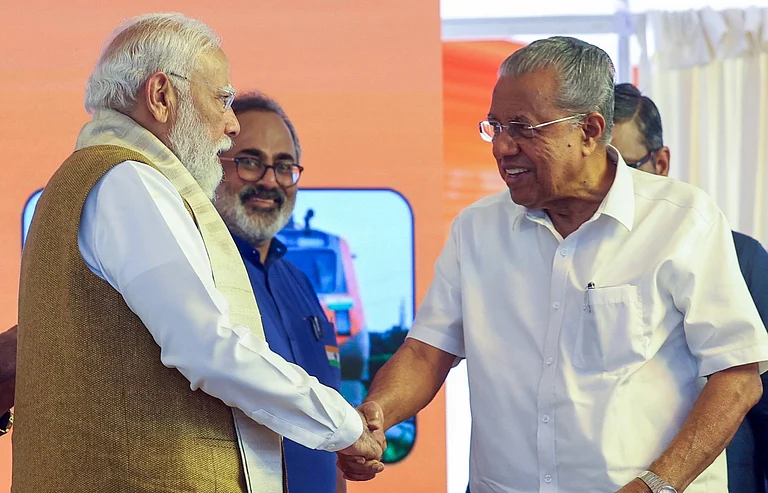
Summary of this article
Tax cuts may not translate into lower consumer prices due to the absence of enforcement.
The Union government has not conducted any comprehensive study before moving ahead with GST restructuring.
With states accounting for 65 per cent of the country’s public spending, their fiscal stability is crucial for the welfare of their citizens.
Kerala Finance Minister K. N. Balagopal has been outspoken about his reservations on the proposed GST restructuring. In this interview, he explains how the move could deprive states of vital financial resources needed to pursue independent policies, warning that if the current system continues, it will undermine the spirit of cooperative federalism.
At the time of the Prime Minister’s Red Fort announcement on Independence Day, on GST restructuring, you had expressed some concerns. With the changes now in place, do you continue to hold those concerns, or have they been addressed?
We have welcomed the GST restructuring in principle, because restructuring, if done properly, should benefit the common man and the consumers. On that, there is no disagreement. But we do have serious reservations, and they arise from past experience. Whenever tax cuts were introduced earlier, the benefit did not consistently flow to the people. What we have seen is that, initially, there may be a slight drop in prices, but very soon, large companies raise them again. As a result, the advantage of tax cuts is absorbed by large corporations and not passed on to consumers. That is why we insist that, alongside restructuring, there must also be strong mechanisms to ensure that the benefits truly reach ordinary people, and not just companies.
That means you think the beneficiaries will be companies?
Yes, that's what the past experience suggests. For example, the Insurance Regulatory and Development Authority (IRDA) has already intimated that the tax cuts may not get reflected in the prices. During the Deepavali festival, companies offer discounts. But after that, prices may go up. This happens because there is no mechanism to see that consumers are benefited by the tax cuts. Earlier, there was an anti-profiteering committee, but it has since become dysfunctional.
The restructuring is comprehensive in the sense that the revenue loss will be huge. You, along with some other state finance ministers, were arguing that the loss to the state government should be compensated. What will be the total loss in revenue due to the restructuring?
The proposal to restructure the GST came from the Union government, and as I said, we all were for it, just because of the fact that the common man will benefit. But before the cut was announced, the Union government should have done a study on how much the loss in revenue would be. But on the losses and the benefits of the government regarding the losses and benefits of the restructuring. It may be a fact that, due to buoyancy, after some time, revenue will increase. But in the meantime, the states will suffer. During this interim period, at the very least, the states should be compensated.
When GST was first introduced, states were compensated for five years, until 2022. After that period ended, several states demanded an extension of compensation. Now, with the restructuring, this demand has only grown stronger. What would be the loss of revenue for states like Kerala, which is considered to be a consumer state?
In Kerala, we have identified four major sectors—automobiles, insurance, electronics, and cement. From these alone, the annual revenue loss will be about Rs 2,500 crore. If we consider all items together, the overall loss would come to around Rs 8,000–10,000 crore annually. This is particularly serious for Kerala because our GST collections are heavily dependent on high-end products. Nearly 78 per cent of Kerala’s GST revenue comes from products that fall under the 28 per cent and 18 per cent tax slabs. A reduction in these rates directly hits our revenue base.
That is why we are demanding that compensation to states be continued, at least for the time being. And this is not just Kerala’s concern. Even BJP-ruled states quietly share the same apprehension, though they may not voice it publicly. States like Karnataka, Tamil Nadu, Telangana, Himachal Pradesh, West Bengal, Punjab, and Jharkhand all joined in a collective representation to the Centre.
Our concern is twofold: first, that the benefits of tax cuts must genuinely reach consumers, and second, that the significant revenue loss to states must be fairly compensated.
States are requesting compensation, but the union government would also incur significant revenue losses due to the restructuring. Then, is it economically prudent to shift the economic burden solely to the Union government’s shoulders?
There is a difference. If we take into account the total expenditure in this country, 65 per cent of it is being spent by the state governments. As far as the state governments are concerned, approximately 45 per cent of their revenue is coming through the GST. So, any reduction in the tax rate is bound to affect the states disproportionately. It is so because when it comes to the Union government, GST is only a portion of its revenue. They have many avenues for resources, such as income tax. Hence, the burden is actually on the states. Any shortfall in the state’s revenue affects its expenditure, which in turn affects the lives of the common man. We are demanding compensation and not out of any political prejudices. Our suggestion is that additional duty be levied on ‘sin’ and luxury goods in addition to the proposed rate, and part of the proceeds be distributed among the states. (Sin goods’ refer to products and services that are considered harmful to individuals or society, either because they damage health or because they are viewed as undesirable from a moral or social standpoint. This category typically includes alcohol, tobacco, gambling, betting, and increasingly even certain food products with high fat, sugar, or salt content. Such goods are deliberately taxed at higher rates, both to discourage their consumption and to generate additional revenue that can be used for public welfare.) Therefore, a demonetisation-like situation should not occur. If this is not done, it will affect cooperative federalism.
GST has now been in operation for seven years. In hindsight, do you think the financial position of states would have been stronger if the old tax regime had continued?
When GST was introduced, I was a member of the Rajya Sabha. During the select committee meeting, I had submitted a dissent note, warning that this new tax regime would eventually reduce state finance ministers to standing before the Union government with a begging bowl. Unfortunately, that fear has become our reality. Let us consider what would have happened if the GST regime had not been introduced. Kerala’s revenue today would have increased to nearly Rs 60,000 crore. Instead, what we actually received last year was only around Rs 32,500 crore. Even if the compensation mechanism had continued, Kerala’s revenue would have been more than Rs 51,000 crore.
This shortfall highlights the structural imbalance in GST and its impact on consumer states like Kerala. That is why we are demanding a revision of the revenue-sharing ratio between the Centre and the states—shifting it to 60:40 in favour of the states. Without such a change, states will struggle to meet their fiscal responsibilities.
Another concern you raised was regarding the tax on the lottery. How will the changes affect Kerala on the revenue side?
More than the question of revenue, our greater concern is the livelihood of nearly two lakh people in Kerala who depend on the lottery sector. That is why we have been demanding that the tax rate be maintained at 28 per cent. However, the Union government has now decided to raise it to 40 per cent, and this will have a huge impact on the sector.
The immediate effect will be a reduction in the commission that agents receive, directly hurting their income and sustainability. In addition, we may be forced to reconsider the pricing of lottery tickets, which could further affect sales and the viability of the industry. This is not just about numbers—it is about protecting a large segment of people whose livelihood depends on the lottery.
The Finance Commission’s interim report is due next month. Southern states, in particular, have been pressing for changes in the criteria for financial devolution. Do you expect your concerns to be addressed in this report?
The Finance Commission is a constitutional body, and in a vast and diverse country like India, the developmental needs of states vary widely. States like Kerala—and to some extent other southern states—have already made tremendous progress in areas such as population control and education. As a result, our development priorities today are very different from those of some northern states, where basic parameters still require urgent attention.
Unfortunately, this progress has worked against us in financial devolution. For example, during the 10th Finance Commission, Kerala’s share in central taxes was 3.8 per cent. Today, it has come down to just 1.9 per cent. In effect, we are being penalised for our achievements in human development. What we are asking for is a fairer system that recognises the diversity of development needs across states and does not punish states that have already performed well.




























